|
Tennessee Titan
Looking back - and forth - at the life
of an aerospace legend
BY MAUREEN JENKINS

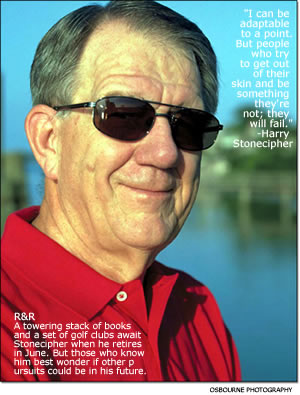 It's
a bit mind-boggling, if you think about it, when you consider the ground
Harry Stonecipher has covered. It's
a bit mind-boggling, if you think about it, when you consider the ground
Harry Stonecipher has covered.
Since helping merge Boeing and McDonnell Douglas five years ago, he's
spent about 80 percent of his time on the road and traveled more than
200,000 miles each year. And throughout his decades-long career, he's
lived and worked in the South, on the West Coast, and scattered points
throughout the Midwest.
Flash back almost half a century.
As a bright-eyed, newly married 18-year-old in Tennessee, he figured he'd
never move north of the Mason-Dixon Line. Well ... maybe to Louisville,
Ky., but that was about far enough.
Funny how life has its own plans. Especially for a man like Stonecipher
for whom travel - from building jet engines and airplanes to overseeing
the latest in aerospace technology - has been the cornerstone of a life's
work.
In June, Vice Chairman Stonecipher will officially retire from The Boeing
Company. He's had a celebrated career filled with highs - McDonnell Douglas'
financial performance soared during his tenure. It's had lows, such as
feelings of isolation while digging Sundstrand Corp. out from under federal
convictions of military fraud in the late 1980s. At Boeing, he's been
a scapegoat and a lightning rod - a role he didn't mind playing - as sweeping
change transformed the company's business culture. But one constant has
been his passionate devotion to his employees' lifelong learning and growth,
the Boeing Leadership Center in St. Louis a testament to that belief.
Even his most vehement critics have to concede that.
But then, there's always been more to Stonecipher than seems obvious.
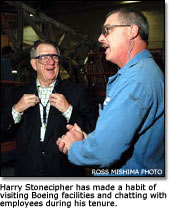 He
has a highly technical mind, but likes nothing more than meandering through
a good art show. He loves skeet shooting and has a 20-shotgun collection,
but holds a warm place in his heart for homeless animals. He's a no-nonsense
businessman, yet is consistently described by those who know him best
as softhearted and kind. Stonecipher can hold his own with business leaders
all over the world, yet still carries with him that Tennessee-bred blend
of practicality or, as some folks say, "mother wit." He
has a highly technical mind, but likes nothing more than meandering through
a good art show. He loves skeet shooting and has a 20-shotgun collection,
but holds a warm place in his heart for homeless animals. He's a no-nonsense
businessman, yet is consistently described by those who know him best
as softhearted and kind. Stonecipher can hold his own with business leaders
all over the world, yet still carries with him that Tennessee-bred blend
of practicality or, as some folks say, "mother wit."
Stonecipher is comfortable being a walking paradox. After nearly 66 years
of living, 47 years of working - and a whole lifetime of learning - he's
found that his collective experiences define the man he's become.
Sure, he's changed some - dropping 57 pounds over the past two years,
slowly weaning himself from 10-hour workdays - but the essence is the
same.
"I can be adaptable to a point," Stonecipher said, "but
people who try to get out of their skin and be something they're not,
they will fail."
Your eyes and ears don't fool you, his colleagues and friends say, when
you're dealing with Harry. It's straight, no chaser, all the time.
Laurette Koellner, senior vice president and chief People and Administration
officer, said that candor makes him easy to work for, and work with.
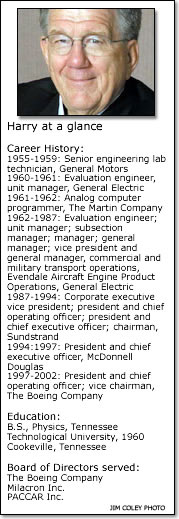 "I
appreciate Harry's directness," said Koellner, now one of three new
members of the Office of the Chairman. Stonecipher's been a mentor to
her since their days at McDonnell Douglas. "He never beats around
the bush. He's honest, straightforward and open - what you see is what
you get." "I
appreciate Harry's directness," said Koellner, now one of three new
members of the Office of the Chairman. Stonecipher's been a mentor to
her since their days at McDonnell Douglas. "He never beats around
the bush. He's honest, straightforward and open - what you see is what
you get."
"He's as blunt like a mountain goat, and just as surefooted,"
added Andrew Wilson, Stonecipher's speechwriter for much of the last decade.
"He's not afraid to butt heads, and he seldom puts a foot in the
wrong place."
He's turned those qualities into a trademark.
For sure, Harry Curtis Stonecipher has traveled farther than he ever
dreamed. Starting out, he had a simple goal - to make as much money as
his grandfather did as a coal mine superintendent. Five hundred dollars
a month, he figured, was reasonable pay.
Stonecipher's obviously exceeded that modest goal, but hasn't forgotten
his humble Scott County, Tenn., roots, where in the late '40s and early
'50s, a "good job" was mining coal.
But his granddad forced Harry to seek other options, telling him, "You
will never work in a coal mine," Stonecipher recalled. "And
I know enough people in the industry to make sure you don't, so you might
as well get on with something else."
Indeed, prophetic words.
"I think everybody's career is influenced by their upbringing and
the environment they grow up in," said Stonecipher, the descendant
of German-American immigrants who settled in Savannah, Ga., in 1738. "You
can break out of an environment, you know. And in fact, I did... My wife
and I reflect many times, 'What if we hadn't made a decision to leave
Tennessee?'"
When it came to his career, he said, "I never had a plan, just kind
of 'go with the flow.' And enjoyed every job I ever had, so that was not
a problem. Didn't have any great aspirations at all."
Passion for books, learning
When Harry Stonecipher and wife Joan were growing up in Helenwood, Tenn.
- a rural place with no traffic signals - residents considered nearby
Oneida the "big town." Even then, he realized there was life
outside the county limits.
"I think in my case, moving out of Scott County just opened the world
up to me," Stonecipher recalled, remembering a high school trip to
Washington, D.C., and another to Nashville, Tenn.
Another eye-opener for young Harry was road trips. "My family tended
to just get in the car and just drive places on weekends," he said,
"just for the experience."
Just like the automobile, books were vehicles that transported the curious
Stonecipher to places beyond. And that's a legacy of his grandmother,
a schoolteacher in Tennessee hill country whose savings helped fund his
college education at Tennessee Technological University in Cookeville.
(A "grandma scholarship," he calls it.)
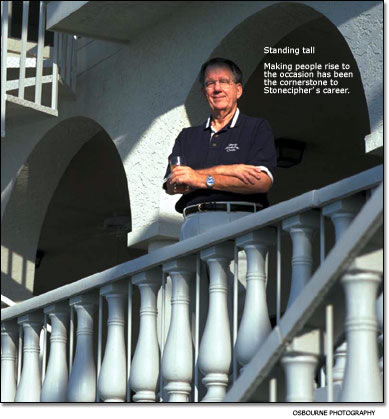 "People
say I could probably read before I could walk, but that's not true,"
he joked. But reading still feels as natural to Stonecipher as breathing.
So does sprinkling conversations with quotes from his well-thumbed books,
the words engraved in his mind. Visit Harry in his 36th floor Chicago
office, and not only will he share favorite passages, but he'll jump up
to grab the book - from his desk, his briefcase, his crowded bookshelves
- and point out its words. He consumes two or three at a time - some for
knowledge, some for entertainment. "I'm not looking for a great awakening,"
he said, "but do it because I can live the experience." "People
say I could probably read before I could walk, but that's not true,"
he joked. But reading still feels as natural to Stonecipher as breathing.
So does sprinkling conversations with quotes from his well-thumbed books,
the words engraved in his mind. Visit Harry in his 36th floor Chicago
office, and not only will he share favorite passages, but he'll jump up
to grab the book - from his desk, his briefcase, his crowded bookshelves
- and point out its words. He consumes two or three at a time - some for
knowledge, some for entertainment. "I'm not looking for a great awakening,"
he said, "but do it because I can live the experience."
In grade school, Stonecipher skipped both the third and seventh grades,
starting college early at age 16. But innate intelligence didn't keep
him from nearly flunking out of Tennessee Tech. In Cookeville, he spent
more time appreciating his freedom than delving into the books. Soon,
he got married, quit school, then went back and changed his major to physics
- thanks largely to a Tennessee Tech professor named Fred Culp.
Turns out the impact was mutual. In Culp's 2001 book Understanding
the Universe, he notes four former students, including Stonecipher,
whose curiosity led to their career success. "What all of these students
had in common," Culp wrote, "was a genuine love of learning
and found a special challenge in learning that which did not come easily."
Decades later, the world has learned it's a mistake to underestimate Harry
Stonecipher. And if there's one thing he can't tolerate, it's people who
try to mislead him.
"My experience is when Harry knows that you know what your issues
are and you're working them, he's very supportive," said Jeff Turner,
vice president and general manager of the BCA Wichita Division. "But
if he gets the feeling you don't know what your issues are, then he's
your worst nightmare."
Stonecipher's hard-driving business persona garners most of the ink in
newspapers, trade publications and magazines. What most do not capture
is the man so passionate about people that he wants his career legacy
to reflect his drive for their personal best.
"He's a hands-off leader who expects people to think independently
and creatively," said Andrew Wilson, "and come up with the solutions...
He has high expectations of people, and expects them to figure out how
to meet them."
And ultimately, Stonecipher said, it's about getting folks accustomed
to, and comfortable with, change.
Building great leaders - on purpose
"You have to change the people, or you have to change the people."
Stonecipher often includes that statement when he speaks to groups around
the world. And it sums up Stonecipher's theory about making people rise
to meet challenges.
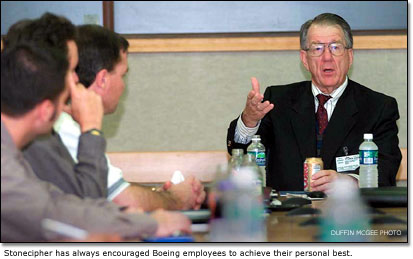 After
the '97 merger, said Chairman and CEO Phil Condit, "the transition/
transformation to a more business-focused culture was required. In some
respects, if Harry hadn't done it, someone else would have had to. But
he certainly played a major role in that happening." After
the '97 merger, said Chairman and CEO Phil Condit, "the transition/
transformation to a more business-focused culture was required. In some
respects, if Harry hadn't done it, someone else would have had to. But
he certainly played a major role in that happening."
That's been the case in Wichita, said Jeff Turner, where Stonecipher encouraged
the site to apply for the Malcolm Baldrige Quality Award and others like
it. Since then, the site has picked up numerous awards for quality improvements,
"and that's all because of Harry," said Turner. In fact, the
Boeing Wichita Management Club feted Stonecipher in March, roasting him
with a presentation half-facetiously titled "The Harry Effect."
"That's a sign of a good leader," said Turner, "someone
who challenges you beyond what you think you're capable of. And when they
leave, they leave you encouraged to do better."
During the Wichita visit, the vice chairman got a detailed site review
from the leadership team. Updates on 747 freighter conversions, B-52 modifications
and the Sonic Cruiser earned Stonecipher's approving nods. In discussions
about diversity issues facing the company and the site, he implored management
to "walk the talk" when addressing employees' concerns and to
become visible role models for their staffs.
Southwest Airlines Chairman and cofounder Herb Kelleher has built a thriving
enterprise on leading by example - a trait he and his friend Stonecipher
share. The two met in the early '80s during negotiations with GE and Boeing
for CFM 56-3 engines. Southwest was one of two launch customers for the
Boeing 737-300. He recalled a story from Harry's GE days.
"It's very important to be out in the field," said Kelleher,
"doing jobs yourself. One day I called and his assistant said, 'He's
not here - he's out in the shop doing some laser welding.' And he really
was. I thought, 'That's my kind of guy.' I just loved that."
Stonecipher's built his legacy on the premise that good leaders aren't
born, but purposely made. At every career stop, he picked up processes
that benefited the next company on his watch. From McDonnell Douglas came
Process Councils and the "Learning Together" tuition reimbursement
plan. And those derived in part from GE's emphasis on management development,
a concept Stonecipher zealously embraced.
The Boeing Leadership Center - one of his non-negotiables when the merger
was done - is tangible proof.
When he was a young manager at General Electric - back in 1968, he supervised
a staff of three - he found he needed to give folks room to learn, to
make their own mistakes. His leadership style evolved further when he
was promoted to supervising 35 people in GE's Product Support Engineering,
those working on business jet and helicopter engines.
"Suddenly, you realize you better get good at selecting people,"
he said. "It's always tough. It's tough today. Because you want to
get in there and say, 'I'll take care of this right now.' But you've got
to let the system work."
It's all about empowerment.
Over the years, said Koellner, "I've seen him spend more and more
time on people issues, stressing the need for continuous development,
excellence in succession planning, and broader opportunities for people
to move around. One thing that's always been nice is whether times were
tough or not, he never lost focus on people."
His scoffers wouldn't agree, but Stonecipher's executive assistant Hazel
Roever, said "the softness of his heart" is Harry's most underrated
asset.
Roever worked for Stonecipher at McDonnell Douglas, followed him to Seattle
after the '97 merger, and even came out of retirement in St. Louis to
see Harry through this year in Chicago.
"He has written some of the most touching notes to people who have
worked closely with him" when they've suffered hardships or loss,
said Roever. "He has a very special way with words."
"His humble background really has been a great plus for Harry, because
it gave him a sense of values and appreciation of people," said Don
O'Hare, former Chairman and CEO of Sundstrand Corp., and a consultant
Stonecipher called his "rock of Gibraltar" during that company's
toughest days in the late ‘80s. "That's served him well."
And that philosophy stands whether he's lecturing up-and-coming Boeing
managers or speaking to outside groups, as he recently did to the Human
Resources Management Association of Chicago.
"If I had to miss a strategy session on the next airplane to be built
or go to the Leadership Center," he told the group, "I'd go
to the Leadership Center." He hasn't missed a speaking engagement
there in 35 straight months.
The education continues
Stonecipher often says the only constant in life is change. But just
how will Harry - used to waking between 4 a.m. and 5 a.m. - handle days
without every 15 minutes scheduled by someone else?
|
|
Stonecipher
says he is looking forward to transitioning from his life around aerospace
to one with his wife, Joan, and their dog, Sam Francis. |
"I've thought about that in terms of Harry, to tell you the truth,"
said Southwest's Herb Kelleher, who was scheduled to retire last Oct.
1, but was pressed back into service because of the Sept. 11 terrorist
attacks' effect on the airline industry. "Harry has indicated he
was really looking forward to (retirement). He has a very active mind
and a great deal of curiosity, and he'll find plenty of things to keep
him constructively occupied."
Koellner said she's got a bet with Stonecipher, one that says he won't
be able to stay away from a fulltime job.
"He's just got so much to offer," she said, "and he's so
involved with the extended (Boeing) enterprise. I just can't imagine him
staying home playing golf."
But in fact, once his working days are through, Stonecipher has a golf
getaway in Scotland planned with several members of his family. Trips
to the theater in New York and London are also in the works, as is settling
back into his homes in Chicago and western Florida.
And while Stonecipher's on the road looking up friends his tireless schedule
has prevented him from really visiting over the years, The Boeing Company
will continue to grow and evolve.
"The honest answer," said Condit, "is I don't think the
company will miss Harry that much, because he's done such a good job of
helping get it ready to continue. Again, that's one of the great jobs
of a leader - to prepare the organization to keep going."
Speechwriter Andrew Wilson concurs, adding that Stonecipher believes French
statesman Charles de Gaulle's quote that "The graveyards are full
of indispensable men."
"He's certainly been very concerned with leading change, building
an organization that's self-perpetuating in its passion and its excellence."
At Condit's request, Stonecipher delayed retirement one year. Besides
giving Condit time to thoughtfully restructure the company, the vice chairman
served as an honest sounding board for the changes to come.
"We shared a common vision for the company," said Condit, "and
he was a great partner. Somebody I could just sit and talk to, share frustrations
with. Unique in the sense that having been a CEO, he clearly understood
what those frustrations were in a way that someone who had not been there
couldn't."
Stonecipher assistant Roever knows her boss had to make hard decisions
over the years. And she, in a way that few others have, has witnessed
firsthand how tough those calls have been.
"This is something no one really likes to do or wants to do,"
said Roever. "I remember he said to me once, 'I'm not here to win
a popularity contest; I was hired to do a job."
Once retired, he'll still offer advice from his seat on the Boeing board
of directors. But when he's away from the boardroom, it'll just be Harry
and that towering stack of books he's been waiting to "get at"
for months.
Because Harry has so internalized the notion of "lifelong learning"
- about leadership and art and whatever other topics he decides to embrace
- retirement won't be an unwelcome guest. And Stonecipher can thank a
1982 sabbatical at New Hampshire's Dartmouth Institute - a benefit from
his GE days - for shaping an outlook that's challenged his restless mind
since then. At the Institute, Stonecipher and other high-level corporate
"students" delved into weighty issues like the Judeo-Christian
notion of creation versus science's big-bang theory.
"Pretty soon, you realized that this is not about which is correct,"
he recalled. "This is about my respecting you to have an opinion
about something. So suddenly, it made me a whole person; it really changed
me."
Even as his retirement nears, Stonecipher wants to make sure the Leadership
Center enhances its "soft side" manager programs, those that
build interpersonal skills and help folks relate better to each other
and their staffs.
"If you limit yourself to constantly studying what will help you
in your job," he said, "you're missing life. You really are.
That's how I got started in art.
"I spent most of my life being a technocrat, but I decided there's
more to life than the laws of physics."
|